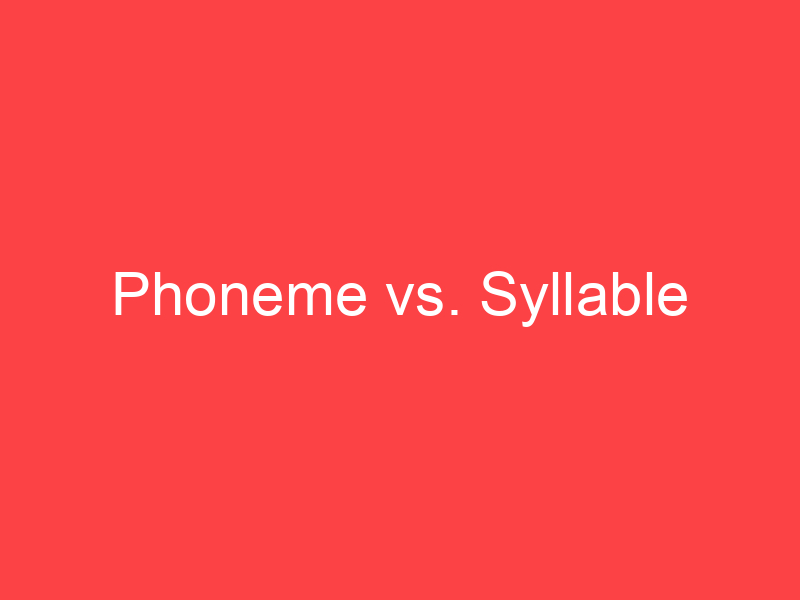Main Difference
The main difference between Phoneme and Syllable is that the Phoneme is a basic unit of phonology and Syllable is a unit of organization for a sequence of speech sounds.
-
Phoneme
For the unit of gesture in sign languages, see CheremeA phoneme () is one of the units of sound that distinguish one word from another in a particular language.
For example, in most dialects of English, the sound patterns (sin) and (sing) are two separate words distinguished by the substitution of one phoneme, /n/, for another phoneme, /ŋ/. (Two words like this that differ in meaning through a contrast of a single phoneme form what is called a minimal pair.) In many other languages these would be interpreted as exactly the same set of phonemes (i.e. /n/ and /ŋ/ would be considered the same).
In linguistics, phonemes (usually established by the use of minimal pairs, such as kill vs kiss or pat vs bat) are written between slashes, e.g. /p/. To show pronunciation more precisely linguists use square brackets, for example [pʰ] (indicating an aspirated p).
Within linguistics there are differing views as to exactly what phonemes are and how a given language should be analyzed in phonemic (or phonematic) terms. However, a phoneme is generally regarded as an abstraction of a set (or equivalence class) of speech sounds (phones) which are perceived as equivalent to each other in a given language. For example, in English, the k sounds in the words kit and skill are not identical (as described below), but they are distributional variants of a single phoneme /k/. Different speech sounds that are realizations of the same phoneme are known as allophones. Allophonic variation may be conditioned, in which case a certain phoneme is realized as a certain allophone in particular phonological environments, or it may be free in which case it may vary randomly. In this way, phonemes are often considered to constitute an abstract underlying representation for segments of words, while speech sounds make up the corresponding phonetic realization, or surface form.
-
Syllable
A syllable is a unit of organization for a sequence of speech sounds. It is typically made up of a syllable nucleus (most often a vowel) with optional initial and final margins (typically, consonants). Syllables are often considered the phonological “building blocks” of words. They can influence the rhythm of a language, its prosody, its poetic metre and its stress patterns. Speech can usually be divided up into a whole number of syllables: for example, the word ignite is composed of two syllables: ig and nite.
Syllabic writing began several hundred years before the first letters. The earliest recorded syllables are on tablets written around 2800 BC in the Sumerian city of Ur. This shift from pictograms to syllables has been called “the most important advance in the history of writing”.A word that consists of a single syllable (like English dog) is called a monosyllable (and is said to be monosyllabic). Similar terms include disyllable (and disyllabic; also bisyllable and bisyllabic) for a word of two syllables; trisyllable (and trisyllabic) for a word of three syllables; and polysyllable (and polysyllabic), which may refer either to a word of more than three syllables or to any word of more than one syllable.
-
Phoneme (noun)
An indivisible unit of sound in a given language. A phoneme is an abstraction of the physical speech sounds (phones) and may encompass several different phones.
-
Syllable (noun)
A unit of human speech that is interpreted by the listener as a single sound, although syllables usually consist of one or more vowel sounds, either alone or combined with the sound of one or more consonants; a word consists of one or more syllables.
“onset|nucleus|coda|rime”
-
Syllable (noun)
The written representation of a given pronounced syllable.
-
Syllable (noun)
A small part of a sentence or discourse; anything concise or short; a particle.
-
Syllable (verb)
To utter in syllables.
-
Phoneme (noun)
any of the perceptually distinct units of sound in a specified language that distinguish one word from another, for example p, b, d, and t in the English words pad, pat, bad, and bat.
-
Syllable (noun)
a unit of pronunciation having one vowel sound, with or without surrounding consonants, forming the whole or a part of a word; for example, there are two syllables in water and three in inferno.
-
Syllable (noun)
a character or characters representing a syllable.
-
Syllable (noun)
the least amount of speech or writing; the least mention of something
“I’d never have breathed a syllable if he’d kept quiet”
-
Syllable (verb)
pronounce (a word or phrase) clearly, syllable by syllable.

